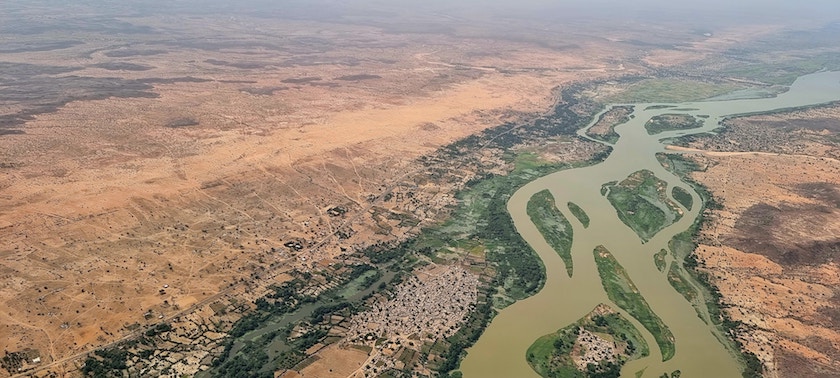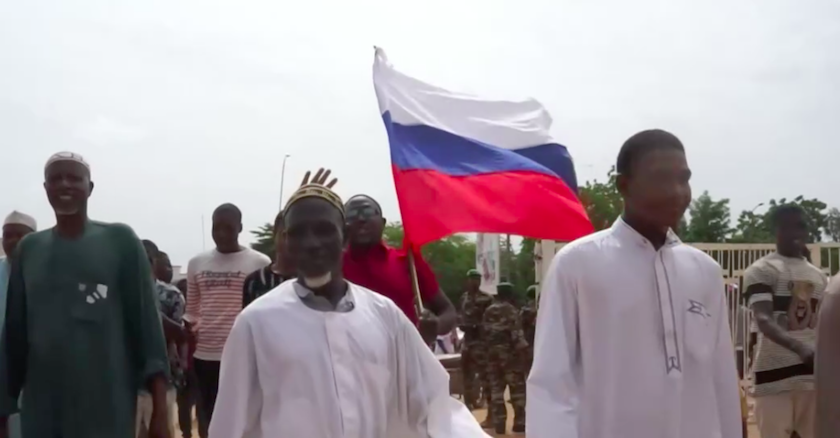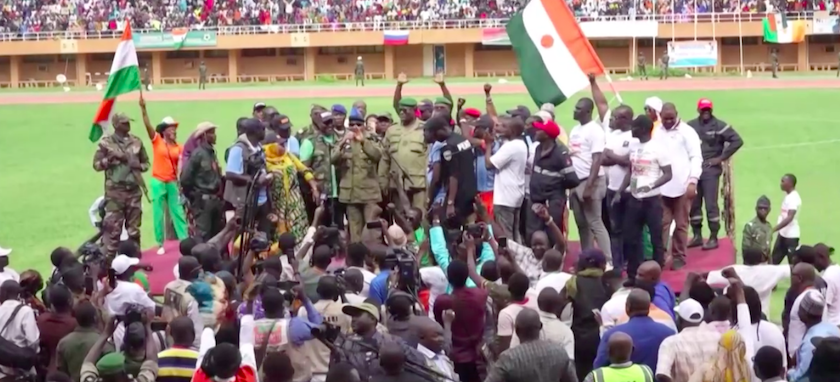The Assemblies of God in the capital, Niamey, say that “the population seems to have accepted” the situation, although other voices refer to an “unexpected” situation.
![Military personnel in the vicinity of Niamey Stadium / Screenshot: [link]RTVE[/link].](https://cms.evangelicalfocus.com/upload/imagenes/64e72702f158a_64e63ef3086f4_Capturadepantalla2023-08-23alas19.12.52.png) Military personnel in the vicinity of Niamey Stadium / Screenshot: [link]RTVE[/link].
Military personnel in the vicinity of Niamey Stadium / Screenshot: [link]RTVE[/link].
Niger has shown that the politics of international alliances are delicate. A coup d'état carried out on 26 July by the presidential guard against President Mohamed Bazoum led to a military junta taking control of the country.
Since then, the National Council for the Safeguarding of the Homeland, led by General Abdourahamane Tchiani, has taken various actions to show that it has sufficient popular support to go ahead. For example, a mass bath in Niamey Stadium, with the various ministers of the junta parading in front of thousands of people.
Internationally, the general message about what has happened was and continues to be one of rejection. The Economic Community of West African States (ECOWAS) threatened the military from the outset with sanctions if they did not reinstate President Bazoum. The international body is now debating whether to apply new sanctions and prolong diplomatic channels, or whether to intervene militarily. For its part, the African Union has suspended Niger “until constitutional order is restored”.
"The situation is calm", leaders of the Central Church of the Assemblies of God in Niamey told Spanish news website Protestante Digital, although they point out that both “the air and land borders remain closed”. This hinders the arrival of food and medicine.

[photo_footer] Aerial view of Niamey, on the banks of the Niger River. / Michel Isamuna, Unsplash. [/photo_footer]
So far, Christians in Niger have expressed different views on the coup. “Christians accept the situation as it is, knowing that the authorities have been appointed by God. They pray for peace, stability and prosperity at all levels in Niger”, says a spokesperson of the Central Church of the Assemblies of God in Niamey. “The population seems to have accepted the coup because thousands of people have spontaneously taken to the streets and even to the General Stadium [of Niamey] to support the new military authorities”, they add.
But Open Doors analyst Illia Djadi, also from Niger, says it is a “really sad” situation. ““This is an unexpected development. Niger has been a safe haven, an island of peace in a very unstable region.
“Even though the country is facing security challenges around its borders, it’s been the only country in the area which has been able to keep a level of security. There are thousands of refugees in Niger because they feel safe there [...] Niger is joining this group of countries run by the military. There is a kind of domino effect. Mali, Burkina Faso, Guinea, Chad and now Niger. Who’s next?”, adds Djadi.
That the situation in Niger has become an issue of international relevance is widely acknowledged. While the military junta that runs the country accuses the ECOWAS countries of imposing “illegal and inhumane” sanctions, Russian flags have been flying at the various demonstrations in Niamey in favour of the coup. “Long live Russia, long live Niger and Nigeriens”, read a sign held by a young man at one of the marches in support of the military.
Although the Kremlin has insisted on a diplomatic resolution to the conflict, in recent weeks it has become public knowledge that one of the coup generals, Salifou Mody, used an official visit to Mali in March to ask for support from the Russian paramilitary group Wagner, journalist Wassim Nasr told The Associated Press.
In the Western bloc, ECOWAS has gone from imposing sanctions that have worsened living conditions in Niger to being divided between members in favour of military intervention and those who continue to prefer a diplomatic solution, albeit with interests. The former include Nigeria, Benin, Côte d'Ivoire and Senegal, and the latter are countries that either oppose the use of force, such as Algeria or Guinea-Conakry, or are controlled by military juntas, such as Mali or Burkina Faso, and claim that they would interpret a military intervention as an attack on them as well.

[photo_footer] A demonstrator holds a Russian flag in Niamey. / Screenshot, RTVE.[/photo_footer]
Regarding Niger’s importance in the West African region, Illia Djadi asserts that the country “is the key ally of Western countries in the fight against terrorism”. An argument that coincides with the concerns of France, the former colonial metropolis that maintained good relations with President Bazoum and which the military junta has also accused of wanting to intervene in the country. “When French troops were kicked out of other West African nations, they were deployed in Niger. Germany did the same. Now there is a new era of uncertainty”, Djadi says.
“It’s exactly what happened in Mali,” he explains. “It all started in 2012 with the coup over the government’s handling of the Tuareg rebellion. Since then, the country has not recovered. They are still trying to fight against the Islamist jihadists. It’s one coup after another. Then the same thing happened in Burkina Faso. It’s one group trying to fix the other. This latest coup in Niger is really a huge set back and source of concern”, says Djadi.
The leadership of the Central Church of the Assemblies of God in Niamey sees the reasons for the coup in the discourse of the military junta. “It is mainly due to insecurity and poor economic and social governance”, they say, and avoid talking about the international level.
The ECOWAS sanctions in response to the military coup have so far mainly involved the isolation of Niger. The closure of its borders makes it difficult for food and medicine to reach Niger, aggravating the situation of millions of people.
According to Unicef, two million children are in need of humanitarian aid in the country.

[photo_footer] Members of the military junta taking a mass bath in Niamey Stadium. / Screenshot, RTVE. [/photo_footer]
The World Food Programme has also expressed concern about the situation. They warn of inflation and “food shortages”, which will worsen as farmers and herders in Niger depend largely on “exports from Nigeria and Benin”. This will have a “negative impact on productivity”. The UN organisation calls for “humanitarian exemptions” to the sanctions to be “rapidly” put in place to ensure supplies for the population.
“Food and pharmaceuticals are needed”, say the Central Church of the Assemblies of God in Niamey, while asking for prayer for the situation. "Stocks are running low and, due to the sanctions currently imposed on Niger, nothing is entering the country", they add.
[analysis][title] Niger’s coup, an opportunity for jihadism? [/title][text]Weeks after the military junta took control of the country, a jihadist attack in western Niger killed 17 soldiers and wounded 20 others. The fight against jihadism was precisely one of the factors that the generals used in their arguments to justify the rebellion. For Djadi, “any political instability can only benefit the Islamist groups. They will all try to benefit from the political instability”.
The Central Church of the Assemblies of God in Niamey explained to Protestante Digital that “Christians [in the country] consider that these new authorities seem a little more impartial” in terms of religious pluralism (Protestants represent less than 1% of the population). And underline that “the church is not being marginalised in the management of the country’s affairs”.
However, the problem of jihadism in Niger (one of the countries with territory where Boko Haram has operated and jihadist activity has grown) has long been observed by organisations dedicated to monitoring religious persecution around the world. Indeed, Open Doors listed the country among the 50 most dangerous countries for Christians in 2022, and worsened its ranking this year from 33rd to 28th. Recently, the international press has reported an increase in the intensity of violence by terrorist groups in the country since the coup.
While the military junta has proposed a three-year transition process, many are critical of its ability to manage the country’s complex diversity over such a long period of time. What has happened in Niger “will open the doors to insurgents”, stressed Djadi. “The army will have limited capacity to fight against the jihadists”.
[/text][/analysis][donate]

Las opiniones vertidas por nuestros colaboradores se realizan a nivel personal, pudiendo coincidir o no con la postura de la dirección de Protestante Digital.
Si quieres comentar o